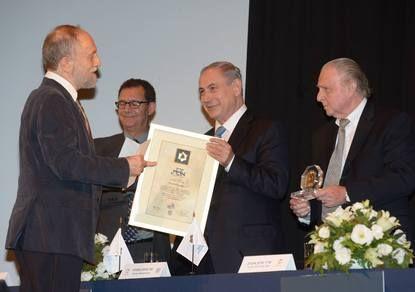Annual EMET Prize Award Ceremony
This does not always come at once. Sometimes it comes little by little, sometimes in an outpouring of innovation and creativity, but both lead to the same result. This is an important and significant contribution to the expansion of human knowledge, not just personal; I use the word ‘human’ because our people is characterized by a great thirst for knowledge, which starts with doubt and curiosity, and if it is possible to share this knowledge and this creativity in wider circles, so much the better.
I read once what Mark Twain wrote about our people 115 years ago. He says:
‘If the statistics are right, the Jews constitute but one quarter of one percent of the human race. It suggests a nebulous puff of star dust lost in the blaze of the Milky Way. Properly, the Jew ought hardly to be heard of, but he is heard of, has always been heard of. He is as prominent on the planet as any other people, and his importance is extravagantly out of proportion to the smallness of his bulk.
His contributions to the world’s list of great names in literature, science, art, music, finance, medicine and abstruse learning are also very out of proportion to the weakness of his numbers. He has made a marvelous fight in this world in all ages; and has done it with his hands tied behind him. He could be vain of himself and be excused for it. The Egyptians, the Babylonians and the Persians rose, filled the planet with sound and splendor, then faded to dream-stuff and passed away; the Greeks and Romans followed and made a vast noise, and they were gone; other people have sprung up and held their torch high for a time but it burned out, and they sit in twilight now, and have vanished.
The Jew saw them all, survived them all, and is now what he always was, exhibiting no decadence, no infirmities, of age, no weakening of his parts, no slowing of his energies, no dulling of his alert but aggressive mind.’
I have two comments on Mark Twain’s remarks. One, he correctly analyzed the extraordinary success of our people, which finds expression, above all, in the Tanakh and the literary assets that we have bequeathed to the family of nations. It has found great expression in the past 115 years. The central place that we have in culture, the arts, technology and innovation are not alone, of course, we stand alongside other peoples. Yet a people that has produced so many Nobel Prize laureates must bear within it some unique cultural heritage. I think that there is here, in addition to curiosity and doubt, a deep urge to break forth and strive for new horizons for all humanity.
My second comment is that he erred in his math. He was not wrong; in his time it was 1%. Today we are a fraction of 1%. This only strengthens the uniqueness that I have described. Today, this uniqueness finds even greater expression as one looks around. In the Middle East we see an opposite trend to modernization. There is boorishness and violent fanaticism that wants to engulf and simply destroy all of the values that are represented here tonight.
I would say that they want to return us to the Middle Ages but perhaps some of you know that my father, the late Prof. Benzion Netanyahu, was a great scholar of the Middle Ages and I here I give these fanatics a great compliment, the early Middle Ages, I would say, the seventh century, if you want alternatives and they give you baksheesh and bring you to the ninth century, to some imamate.
Israel is prominent, not just our people, not just vis-à-vis the achievements of the past century, but also in what is taking place around us today. Israel is the only democracy in the Middle East and it will remain a democracy with equality for all its citizens. Nothing will change this and we will not allow anything to change it. This is in our soul and in our character. This creativity, our creativity, is also important in fashioning not only our identity but the future of humanity as well.
I must tell you I am very excited to be here today because I remember over 40 years ago, when I arrived at MIT, there was a brilliant Israeli student there named Shimon Ullman who explained to me then about artificial intelligence – this was over 40 years ago, and you understand that this was a discipline that started a little earlier but was still in its infancy. Many, Shimon, of those who achieved breakthroughs in this field were Jewish, and you joined them. I thought about how much this attests to the ability to think differently, about the ability to create new things that quickly gain momentum in this and other fields.
There is a mighty struggle going on in our world between modernity and the deterministic and fanatical past. Our mission is to do something different. Every people needs to deepen its roots and its culture and must spread its wings toward the skies – and our people is doing so and I think that the combination is not coincidental. We draw on our ancient heritage about which there was also doubt and defiance towards G-d from the very outset, about the order of the ancient world, that supported endless subjugation. The idea of freedom was born among the Jewish People. Questioning was born among, and remains with, the Jewish People, and you, who are continuing to ask and to create, you, along with many others among our people, are ensuring that Israel will continue to be a beacon of progress to our people and to all humanity.
Congratulations, deep congratulations, for your creativity and your contributions to humanity and to the Jewish People. Thank you, thank you very much."

